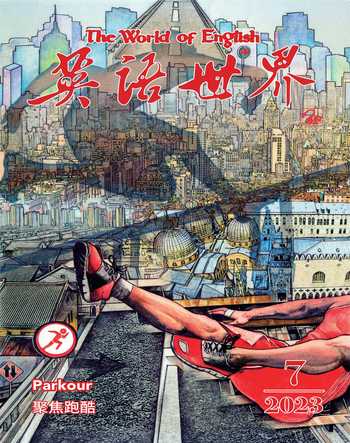A Robot Tries to Make Sense of Humanity试图理解人性的机器人
2023-07-22罗恩·查尔斯孙美萍/译
罗恩·查尔斯 孙美萍/译


One hundred years ago, a play titled “R.U.R.,” by Karel Capek, debuted in Prague and gave us the word “robot.” Since then, androids have been dreaming of electric sheep1, and weve been having nightmares about the robot apocalypse2. But calamity rarely comes in the neat, clarifying ways we fear.
一百年前,卡雷尔·恰佩克的戏剧《R. U. R.》在布拉格首演,这部戏剧为我们带来了“机器人”一词。之后,仿生人一直梦见电子羊,我们则做着关于机器人大劫难的噩梦。但是灾难很少以我们所害怕的那种简洁明了的方式降临。
Leave it to Kazuo Ishiguro to articulate our inchoate3 anxieties about the future were building. “Klara and the Sun”, his first novel since winning the Nobel Prize in 2017, is a delicate, haunting story, steeped in sorrow and hope. Readers still reeling from4 his 2005 novel “Never Let Me Go” will find here a gentler exploration of the price children pay for modern advancements. But if the weird complications of technology frame the plot, the real subject, as always in Ishiguros dusk-lit fiction, is the moral quandary5 of the human heart.
我们对自己正在建设的未来怀有模糊不清的焦虑,让我们把这焦虑留给石黑一雄去阐释清楚吧。《克拉拉与太阳》是石黑一雄自2017年获得诺贝尔文学奖之后的第一部小说,讲述了一个微妙又让人难以忘怀的故事,充斥着忧伤与希望。对还没有从他2005年的小说《莫失莫忘》中缓过神来的读者而言,他们会发现《克拉拉与太阳》就孩子们为现代进步付出的代价进行了更温和的探讨。然而,如果说用技术奇怪的复杂性来框定情节,那么与石黑一雄以往的“黄昏文学式”小说一样,这部小说真正的主题是人心所面临的道德困境。
Klara, the narrator of this genre-straddling novel, is an Artificial Friend (AF), a popular class of androids designed to provide companionship to teenagers. Why young people would need artificial companionship is one of the chilling questions that Ishiguro raises but postpones so naturally that the horror feels almost incidental.
這部跨体裁小说的叙述者克拉拉是一名人工朋友(AF),即一类广受欢迎的人形机器人,旨在为青少年提供陪伴。为什么年轻人需要人工朋友陪伴?这是石黑一雄提出的令人不寒而栗的问题之一,但是他很自然地搁置了这个问题,以至于让人感觉恐惧是种偶然。
When we meet Klara, she (it?) is on display in something like the Apple Store, an elegant retail shop catering to well-heeled6 parents. Older AFs such as Klara rotate with the latest models, competing for attention based on their specifications and social cachet7. Klaras particular skill is empathetic observation. She sits in the store window like a teddy bear on Christmas Eve, waiting for a young person to notice and take her home.
克拉拉出场时,她(它?)被放在类似于苹果商店的地方展示,那是一家面向富有家长的高档零售店。像克拉拉这样的老款AF与最新款AF轮流展示,双方依靠各自的技术规格以及在社会上的名声来争夺顾客的关注。克拉拉的特殊技能是感同身受地观察。她像圣诞节前夜的泰迪熊一样坐在商店橱窗里,等待有孩子发现她并带她回家。
Powered by solar energy, Klara takes a keen interest in the sun. Its rays literally give her life, and she notices how daylight enlivens everyone outside the store, too. Its not such a leap for her to conclude that the sun is an omnipotent, often benevolent being capable of casting his invigorating light on those whom he chooses. That faith, if you will, becomes the abiding premise of Klaras life—and the haunting complication of this novel.
克拉拉由太阳能驱动,因此她对太阳有浓厚的兴趣。阳光确实给了她生命,而且她注意到阳光也让店外的每个人都活跃了起来。于是,克拉拉顺理成章地得出一个结论:太阳是全能的存在,常常表现出仁慈,可以将自己生机勃勃的光芒投射在他所选择的人身上。这一信念,如果你愿意这样说的话,成为克拉拉一生的永恒前提——也是这部小说中萦绕不去的复杂因素。
The story begins in earnest when Klara is purchased to be the companion for a bright but sickly teenager named Josie. She moves into an isolated country house and takes up her role as an attentive Artificial Friend. The housekeeper treats her with suspicion bordering on disgust, but Klaras programming doesnt include resentment, and, in any case, she gets along well with Josie, and Josies mother seems particularly taken with8 her.
克拉拉被买下来与活泼但多病的少女乔西作伴,故事由此正式开始。克拉拉搬进偏僻的乡间别墅,开始扮演体贴的AF角色。管家以近乎厌恶的怀疑态度对待她,但是她的程序中不包含怨恨。无论如何,她和乔西相处得很好,而且乔西的母亲似乎特别喜欢她。
Theres a Jamesian quality9 to the searching, deliberate portrayal of life in Josies remote house. Like Klara, Ishiguro attends closely to the way apparently innocuous10 conversations shift, the way joy drains from a frozen smile. This is a home recovering from grief and bracing for more.
该书对乔西在偏远别墅中的生活做了谨慎从容的探寻性描述,颇具亨利·詹姆斯的风格。像克拉拉一样,石黑一雄也密切关注着看似无伤大雅的谈话如何转变,喜悦如何从凝固的笑容中消失。这是一个渐渐从悲伤中恢复,但又准备迎接更多悲伤的家庭。
Josies illness—like the life-threatening ailments in fairy tales—is never diagnosed, but its the source of the homes ever-rising alarm. The possibility of her death ratchets up11 the pressure on Josies mother to pretend that nothing is wrong even while preparing for the next terrifying loss. Klara, determined to help any way she can, is left to discern sensitivities she can sense but not entirely grasp. She may be an Artificial Friend, but there is nothing artificial about her friendship. “I knew my best course was to work harder than ever to be a good AF to Josie until the shadows receded,” Klara tells us. “At the same time, what was becoming clear to me was the extent to which humans, in their wish to escape loneliness, made maneuvers that were very complex and hard to fathom.”
喬西的病就像童话故事中威胁生命的疾病一样,从未确诊,但构成了家中警报不断升级的原因。乔西可能会死这件事让她母亲的压力逐渐增大,即使正在为又一场可怕的死亡做准备,她母亲也要假装一切正常。克拉拉决定尽己所能提供帮助,她发现自己能分辨出敏感问题——那些问题她能感知却无法完全掌握。她或许是个“人造的朋友”,但是她的友情不夹杂任何人工的成分。“我明白最好的做法就是比以往更努力地工作,做好乔西的好AF,直到阴影散去。”克拉拉告诉我们,“同时,我越来越清楚的是,人类为了逃避孤独,会采取何等复杂并难以理解的策略。”
Beyond the dark enchantment of this peaceful house, Ishiguro suggests a world radically transformed. Another author would have been eager to elaborate on the dystopian features of the not-too-distant era, but Ishiguro always implies, never details. One reads Ishiguro in a defensive crouch, afraid to have our worst suspicions confirmed. Were left to intuit that the economy has been revolutionized, hollowing out the middle class. Odd new social practices have arisen, too, such as “interaction meetings” in which teenagers gather at one anothers houses to practice getting along. For readers whose children endure remote learning, this is unnervingly close to the bone12.
除了表现出这座宁静别墅的黑暗魅力,石黑一雄还暗示了一个遭到彻底颠覆的世界。要是换成另一位作者,对于这个不太遥远的时代,他可能会急于详细描述其反乌托邦特质,但石黑一雄总是暗示,从不揭露细节。读者以蜷伏的防御姿势读石黑一雄的作品,害怕自己最坏的猜想得到证实。我们只能凭直觉知道经济发生了革命性巨变,中产阶级已被掏空。与此同时,社会上出现了奇怪的新习俗,例如“交流聚会”,即青少年聚在彼此家里练习如何和睦相处。对于家中孩子长时间接受远程教育的读者而言,这样的情节触及了痛点,令人不安。
But the most unsettling reference in “Klara and the Sun” concerns a process called “lifting”. Its some kind of genetic enhancement—rarely fatal—that has created a superclass of young people, completely altering adolescence, college admissions and employment possibilities.
但是《克拉拉與太阳》中最令人不安的说法是一个叫作“提升”的程序。这是某种极少致命的基因强化术,已经创造出一个由年轻人组成的超级阶层,完全改变了青少年、大学录取过程以及各种就业选择。
Creepy as this is, its not so far off from current genetic research, and it certainly comports with the desires of frantic parents who will stop at nothing to13 promote their darlings. Thats the real power of this novel: Ishiguros ability to embrace a whole web of moral concerns about how we navigate technological advancements, environmental degradation and economic challenges even while dealing with the unalterable fact that we still die.
这虽然令人毛骨悚然,但与当下的基因研究相去不远。当然,这也符合疯狂父母的心愿,他们为了自己宝贝孩子的发展不择手段。这是这部小说的真正力量所在:石黑一雄有能力一边领悟关乎我们如何驾驭技术进步、应对环境退化、迎接经济挑战的一系列道德问题,一边讨论不可改变的事实——我们仍会死亡。
Telling this story from Klaras algorithmic point of view is a perilous choice, even for an author used to risky narrative maneuvers. With her childlike intensity, Klara evinces14 a kind of devotion that could sound preprogrammed, like listening to the reassuring15 voice of an automatic telephone operator for 300 pages. But Ishiguro has perfectly calibrated16 Klaras uncanny tone, with a personality just warm enough and alien enough to feel like the Artificial Friend we all need. Even her radical faith in the sun is moving and profound. Seeing her construct her own theodicy from the simple process of observing and reasoning is like watching the passage of 2,000 years over a few months.
即便对于习惯了冒险叙事策略的作者而言,采用克拉拉的算法视角来讲述故事也是一个危险的选择。克拉拉带着孩童般的热情,表现出一种听起来像是预编好的奉献精神,就像听一名自动接线员用令人安心的声音念了300页。但是石黑一雄把克拉拉的神秘腔调设定得十分完美,她的性格恰如其分地既温暖又陌生,让人觉得她就是我们都需要的人工朋友。就连她对太阳的激进信仰也无比深刻、令人动容。我们看她依靠简单的观察和推理来构建自己的自然神学,就像看两千年的时光在几个月里流逝而去。
Of course, tales of sensitive robots determined to help us survive our self-destructive impulses are not unknown in the canon of science fiction. But Ishiguro brings to this poignant subgenre a uniquely elegant style and flawless control of dramatic pacing. In his telling, Klaras self-abnegation feels both ennobling and tragic.
敏感的机器人决定帮我们在自我毁灭的冲动中活下来,这样的故事在经典科幻小说中当然不少见。但是石黑一雄为这一深刻的文学亚类型赋予了独特的优雅风格,展现出对戏剧节奏的完美把控。在他的叙述中,克拉拉的自我牺牲既高贵又悲惨。
(译者为“《英语世界》杯”翻译大赛获奖者;单位:北京外国语大学)
